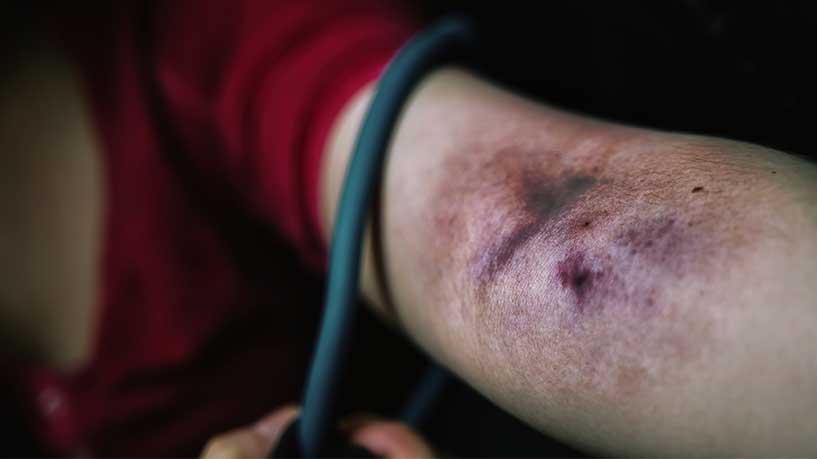What Are Track Marks?

Medically Reviewed By: Kimberly Langdon, M.D.
Many people who inject heroin or other drugs develop track marks. Track marks are wounds that appear at drug injection sites, such as the arms or legs. They may resemble puncture marks, scabs, or scars. No matter what they look like, track marks are often a sign of drug addiction.

In Ohio, about 200,000 people live with opioid addiction. One of the most accessible and dangerous opioids is heroin, and many Ohio residents with heroin addiction inject it through their veins.
Other drugs that are commonly injected include prescription opioids, prescription stimulants, cocaine, and methamphetamine. All forms of injection drug use can cause track marks.
What Are Track Marks?
Track marks are wounds that appear at drug injection sites. The appearance of track marks varies. When they first appear, they often resemble pink or red puncture wounds.
Over time, the punctures may crack or bleed. Eventually, they will become scabs, and the scabs later become scars. The scars are often raised and darker than the rest of the skin.
Where Do Track Marks Appear?
Track marks can appear on any area of the body where a person injects drugs.
Many people inject drugs into their arms. They will often use their dominant arm to easily inject the drug into their non-dominant arm. However, some people may ask their friends to inject the drug into their dominant arm. Other injection sites may include:
- legs
- hands
- feet
- ankles
- neck
- groin
Because track marks can be a tell-tale sign of drug abuse, most people try to hide them. For example, a person with track marks on their forearms might wear long sleeves all the time, even in hot weather. Other people hide track marks with makeup or even tattoos.
Other Risks Of Injection Drug Use
Along with causing track marks, intravenous drug use poses serious health risks, including:
Vein Damage
Repeated injection of the same vein can lead to vein damage, specifically collapsed veins. Collapsed veins occur when a vein’s exterior walls cave in, which restricts blood flow.
This condition can cause swelling, pain, and inflammation. You face an increased risk of collapsed veins if you use blunt needles.
Blood Clots
Regular iv drug use can cause blood clots, which can lead to deep vein thrombosis (DVT). This condition occurs when a blood clot forms in a vein that is deep in the body, usually in the legs. Common symptoms include:
- leg pain or cramping
- leg swelling
- changes in the leg’s skin color
When left untreated, DVT can lead to a life-threatening condition called pulmonary embolism (PE). PE causes serious symptoms like chest pain, shortness of breath, and coughing up blood. If you or someone you know experiences these symptoms, call 911 right away.
Skin Infections
Injection drug use, or shooting up, can cause serious infections at injection sites. The most common type of skin infection caused by injection drug use is cellulitis. This bacterial infection causes pain, redness, and swelling in the infected area.
Cellulitis and other bacterial infections can also cause skin abscesses. A skin abscess is a buildup of pus and debris. While smaller abscesses may drain naturally, more serious ones must be drained in a hospital by a surgeon.
In addition, some people who inject drugs develop wound botulism, which is a serious condition that occurs when a germ called Clostridium botulinum enters an injection site. The infection causes symptoms such as blurred vision, slurred speech, and trouble swallowing.
Infectious Diseases
Many people who inject drugs share needles. This practice increases your risk of various infectious diseases, including HIV/AIDS, hepatitis B, and hepatitis C. All of these conditions can have serious, life-threatening complications when left untreated.
Treating Injection Drug Use
The only way to avoid the above health risks is to never use injection drugs unless instructed by your healthcare provider. If you feel unable to stop using injection drugs, you may have drug addiction (also called substance use disorder). This serious disease causes symptoms such as:
- intense cravings for drugs
- mood swings
- loss of interest in activities once enjoyed
- loss of motivation
- tolerance, which means you need increasingly larger or more frequent amounts of a drug to feel the desired effects
- physical dependence, which means you experience unpleasant withdrawal symptoms, such as anxiety and sweating, when you don’t use drugs
If you or someone you love experiences the above symptoms, seek help at a substance abuse treatment program. Available on an inpatient or outpatient basis, addiction treatment centers offer a variety of services to help you stop using injection drugs, such as:
- medical detox, in which doctors help you manage withdrawal symptoms as you become drug-free
- mental health counseling, in which therapists help you manage drug cravings and strengthen your overall mental health
- support groups, in which you can discuss your experiences with other people recovering from injection drug use
During treatment, your doctors will also address any vein damage, skin infections, or other health problems related to your injection drug use. Depending on your needs, you may receive wound care, medications, and other treatment options to help you heal.
If you or a loved one struggles with injection drug abuse, please reach out to Ohio Recovery Center. Our compassionate treatment providers offer a variety of evidence-based services to help you build a healthy, sober life.
- Centers for Disease Control and Prevention — Injection Drug Use and Wound Botulism https://www.cdc.gov/botulism/wound-botulism.html
- Ohio State University — Opioid Epidemic in Ohio – Extension in Action https://extension.osu.edu/about/resources/opioid-epidemic-ohio-%E2%80%93-extension-action#
- Virginia Department of Health — Opioids And Injection Drug Use https://www.vdh.virginia.gov/content/uploads/sites/10/2021/10/HCV-PWID_2021.pdf

